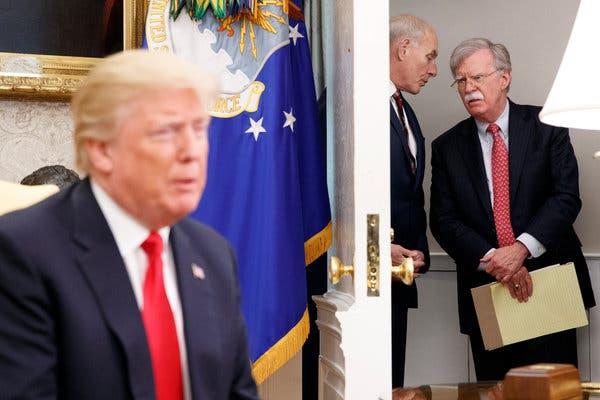In perhaps the best sign thus far that a potential US war with Iran has been averted (at least for the near term), given the possibility that both heightened saber-rattling and the potential for an “accidental” deadly encounter between IRGC forces and the recent build-up of American deployments could have led to a major conflict, White House National Security Adviser John Bolton himself appears to now be fast climbing down the escalation ladder.
According to Reuters on Thursday Bolton is singing a different tune compared to the war rhetoric of the past weeks since the crisis began: “The threat from Iran is not over but quick action from the United States has helped deter it.” This echoes a prior Pentagon statement essentially saying the “clear” Iran threat intelligence against US forces was accurate but that the US carrier and other extra force deployments to the Persian Gulf region thwarted Iran’s intentions.
“I don’t think this threat is over, but I do think you can make at least a conditional claim that the quick response and the deployment and other steps that we took did serve as a deterrent,” Bolton told reporters during a visit to London on Thursday.

When pressed over whether he was at odds with President Trump who has repeatedly stated the US is not looking for regime change in Tehran, Bolton responded:
“The policy we’re pursuing is not a policy of regime change. That’s the fact and everybody should understand it that way.”
Bolton even seemed to have backed away from prior statements of defense officials which accused Iran’s leaders of having “ordered” attacks on oil tankers near the Strait of Hormuz as well as a Saudi oil pipeline in the past weeks.
Late last week an official Pentagon statement said “the leadership of Iran at the highest level” ordered a spate of disruptive attacks.
But now Bolton seems have have introduced more ambiguity, identifying Iran’s “surrogates” – and stopping short of prior direct and more aggressive “top leadership” accusations – as possibly behind the attacks. Per Reuters:
Bolton said there was some prospect that evidence Iran was behind attacks this month on oil tankers in the Gulf would be presented to the United Nations Security Council next week.
“I don’t think anybody who is familiar with the situation in the region, whether they have examined the evidence or not, has come to any conclusion other than that these attacks were carried out by Iran or their surrogates,” he said.
Over the past week, following Trump’s extended hand for Iran’s leaders to “call me,” we’ve seen a consistent deescalation following weeks of dangerous escalation, including threats and counter-threats of military action by both sides.
Iranian President Hassan Rouhani reportedly said this week that the “road is not closed” on talks with the US if Washington drops the sanctions and returns to upholding the 2015 nuclear deal (JCPOA) – something not at all likely to happen.
via ZeroHedge News http://bit.ly/2JMh5wH Tyler Durden